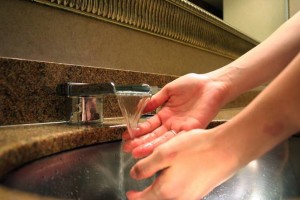Source: treehugger.com
Published: April 1, 2016

CC BY 2.0 Sarah Laval
Minimize the number of ingredients and the tools required to keep your house clean, as well as the waste generated by the cleaning process.
A house is not truly clean if the process of cleaning it has resulted in all kinds of unnecessary waste. Conventional cleaning relies on chemical products, plastic bottles, paper towels, plastic bags, sponges, and disposable wipes, but it doesn’t have to be that way.
A zero-waste cleaning routine, by contrast, relies on durable tools that can be washed and reused. It uses non-toxic, natural, even edible cleaning products that will not contaminate your home by leaving unhealthy residues. And it will not fill up the trash can with empty, dirty containers and cloths that need to be hauled away.
Zero-waste cleaning tools:
Rags are the most logical, economical, and reusable item you can possibly use. Forget paper towels! Tear up old T-shirts, bed sheets, and towels. Launder after use so they’re ready for the next time.
Repurpose old items for cleaning. Old kitchen sponges are good for cleaning bathrooms. (Cut the corners off so you don’t mistake them for the sponges currently being used for dishes.) Old toothbrushes are excellent for cleaning in between tiles and hard-to-reach corners. You can also use a compostable bamboo-handled brush with natural bristles (good for toilets) or hemp scrubber.
Cotton flour sack towels make great cleaning cloths. They are more biodegradable and absorbent than microfiber. You can buy online.
Microfiber cloths, such as Norwex, clean effectively with no added soap, capturing bacteria and grease. (I didn’t believe it worked until I tried it. Now I don’t use anything but water on windows and mirrors.)
Galvanized buckets are better than breakable plastic ones. They last forever. You might even be able to find one in an antique store or your grandma’s basement.
Choose a mop with a wooden handle and removable head that can be thrown in the washing machine. Stay away from disposable wet floor wipes, as they do not biodegrade and create serious blockages in sewer systems. You can also use a rag tied attached to a mop head (secure with rubber bands or twine).
Sweep with a wooden-handled straw broom (it’s biodegradable!) and a dustpan.
A couple glass spray bottles and glass shaker container with a metal lid are all you need. Fill one spray bottle with vinegar, the other with some castile soap or grated soap flakes mixed with water. The shaker is perfect for baking soda, which you’ll always need on hand.
I love my Dyson upright vacuum cleaner, which I bought refurbished years ago. It comes with a reusable filter that can be tossed in the dishwasher as needed and the canister gets emptied right into the garbage or compost. Dysons are pricey but they make a great product that works well and, so far, has lasted several years for me with no issue.
Zero-waste cleaners:
Baking soda is a real workhorse. It can do almost anything – cleaning, scrubbing, absorbing odors, clearing drains, shining silver, killing mold (when used together with white vinegar), and more. Buy it in bulk in reusable containers.
White vinegar disinfects, softens fabric in the wash, cleans everything from toilets to vegetables to floors, deodorizes, and clears drains. It is often used with baking soda. (Note: Apple cider vinegar cleans just as well as white, but it takes longer for the smell to go away.) You can even make your own vinegar using apple scraps or lemons.
Citrus is an excellent cleaning agent. You can rub the peels on taps, sink, floor, and tub. Lemon juice can replace vinegar. See this list of 16 ways to use citrus to clean your house. Compost the leftovers.
Basic bar soap is useful. Try the all-purpose cleaning bars sold by Meliora K; they come packaged in brown paper. You can grate them and mix with water to make a cleaning solution, or use as a stain stick for laundry. Olive oil-based Savon de Marseille (or a locally produced equivalent) is good.
Castile soap, such as Dr. Bronner’s, can be purchased at many bulk food stores in reusable containers. A few drops go a long way toward cleaning and leaving your house smelling extra-fresh, especially if you use peppermint- or tea tree oil-scented soap.
Coconut oil, which can be purchased in bulk in reusable containers, is good for removing stains/spots on upholstery and carpets, polishing patent leather, removing chewing gum, and cleaning shower scum when rubbed vigorously with a rag.
Fresh air should not be overlooked! The ultimate zero-waste ingredient, opening your windows will replace the need for air fresheners in disposable containers and the toxic ingredients they contain. Hang laundry to dry in the fresh air and you won’t miss scented detergent or softener.
